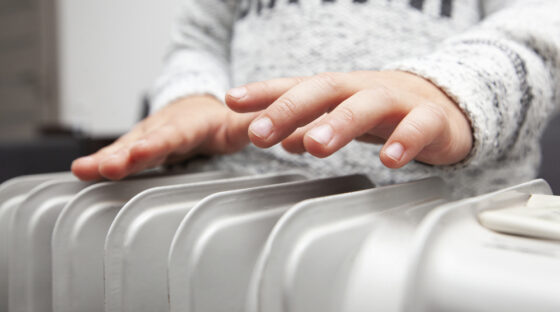In court and at home: students struggle with soaring energy prices


This week Dutch students union LSvB will be in court in a case against Vijfheerenlanden town council, as part of its efforts to win extra cash for students struggling to pay their energy bills.
The case is one of 55 which the union is monitoring nationwide, following the cabinet’s decision to exclude students from the €1,300 energy allowance payable to people with low incomes – a move which has spurred a long legal battle.
Spring may be here, but many students are still struggling to pay their bills and keep their homes warm following the surge in gas and electricity prices.
Perrine Estorges (19), a French international studies student living in The Hague, is one of many living in student housing who faces far higher bills. ‘We had a fixed price energy contract at the beginning. In October, we received a warning from our company that the rate will go up. November was €890 for six people, when it was normally €306,’ she told Dutch News.
Estorges and her housemates have been forced to get creative to conserve energy. They brought in rules – no heating in the communal areas, one hour of heating a day in their rooms – in an effort to cut costs, a move which not everyone in the house agrees with.
Lucas Verhoeven, an international studies student from Maastricht, has also been struggling to cope with rising energy prices. Living with eight other people in a rented apartment, Verhoeven has seen his rent increase from €500 all-inclusive to €620 in just a few months.
‘I can’t afford anything. I’m already borrowing at full capacity and I can’t make ends meet,’ he said. ‘Whether I get to stay in the room depends largely on the energy prices, otherwise I will be kicked out.’
Verhoeven’s landlord has taken drastic measures to keep energy costs down, threatening to evict tenants caught using electric heaters or consuming too much energy.
‘He taped our oven shut so that we couldn’t use it anymore because it consumed too much energy. He also threatened to take our washing machine,’ Verhoeven said. ‘The police told me that it would be illegal to evict me, but by the time they process my report I will have been in the street for months…with the current housing crisis I have no alternative’.
Shower at the gym
Lucas is trying his own set of strategies to save energy. ‘My main source of heating is a hot water bottle, since I do not turn on the heater, even though I can feel the draft,’ he said. ‘I do not turn on the lights. I just rely on candles and an LED strip. I have also stopped showering at home and do it at the gym instead.’
Other students have not yet been hit by higher bills but worry about what is to come. Sarah (23), a German master’s student at the University of Utrecht, has a weakened immune system and needs to keep warm. She has not yet been billed for her energy consumption as her landlord administers the cost.
‘If my landlord tells me at the end of the year that I have used more, I do not know what to do,’ she said. ‘I will have to borrow money, take out a loan… I hardly make ends meet nowadays given inflation. If there is a bill, I simply do not know how I will pay it.’
Legal struggle
When the government announced the additional payment for poor households in March 2022, experts were quick to point out that excluding students was legally baseless. The government argued that since students are able to access student financing, they would be ‘overcompensated’.
Judges have already agreed with students in Amsterdam and Nijmegen who argued that excluding them constituted discrimination. Other councils such as Delft and Zwolle took the decision early on to lift the eligibility criteria.
Poverty minister Carola Schouten has said these cases were ‘individual cases against individual councils’ rather than a nation-wide phenomenon. Struggling students, she said, could still apply for a special payment, for which the government has set aside €35 million.
However, says LSvB board member Midas Bosman, ‘the application procedure for that payment is very invasive and restrictive, which systematically excludes many students.’
‘The policy remains discriminatory,’ he said.
The LSvB has adopted a strategy of ‘request it even if you are not eligible’. Since early last year, they have been providing information to help students appeal against their council’s decision and take them to court. Some 55 cases are now underway.
The issue has impacted on international students disproportionately, since they may not be aware of their rights, Bosman said. Only around 5% of inquiries made the LSVB’s hotline come from international students, even though they represent 16% of the student body at universities.
Thank you for donating to DutchNews.nl.
We could not provide the Dutch News service, and keep it free of charge, without the generous support of our readers. Your donations allow us to report on issues you tell us matter, and provide you with a summary of the most important Dutch news each day.
Make a donation